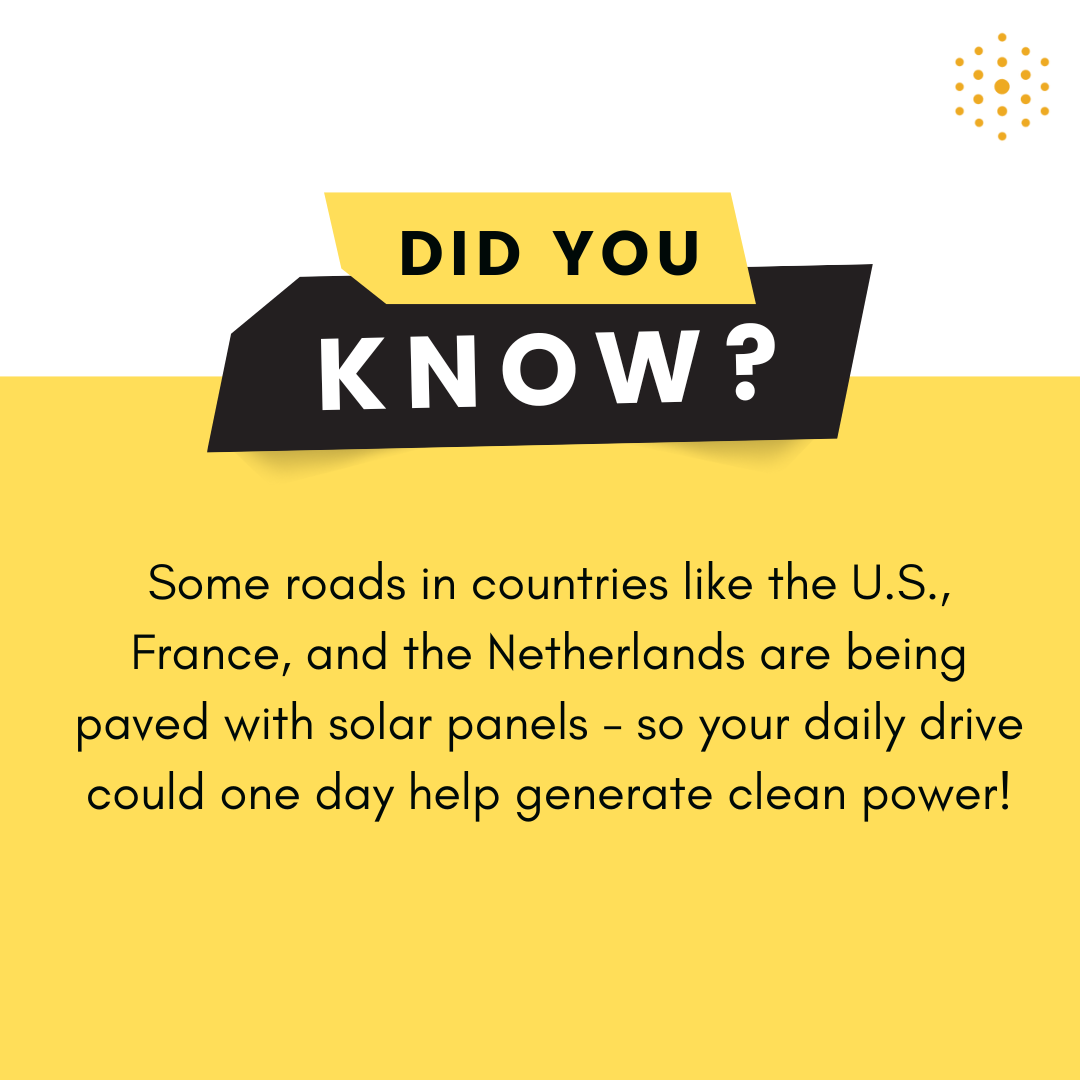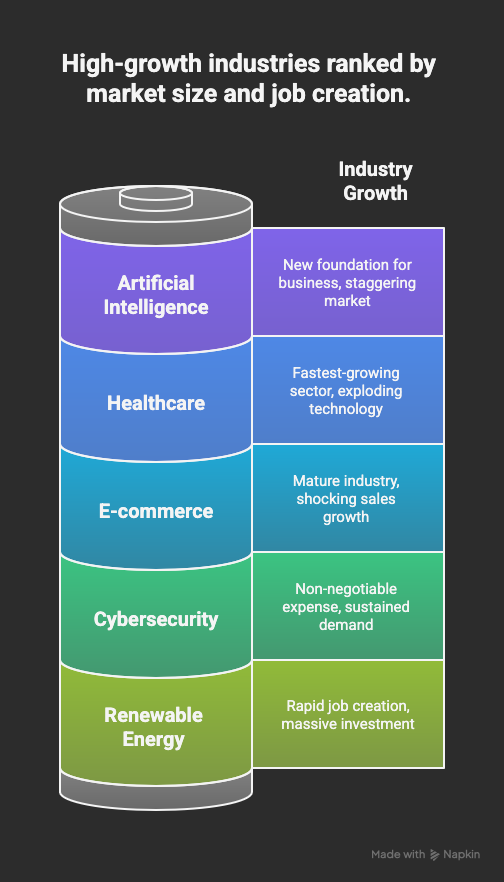Which industries are growing fastest this decade—and how can professionals break in?
The five breakout industries shaping this decade are Renewable Energy, Artificial Intelligence & Data Science, Healthcare & Health Tech, Cybersecurity, and E-commerce & Digital Marketing. Growth is fueled by AI innovation, sustainability policies, and digital adoption. To enter, focus on skill-based entry points—project coordination in renewables, applied AI projects, non-clinical health-tech roles, GRC in cybersecurity, or analytics in digital marketing. Demonstrate data-driven results and continuous learning to stay future-proof.
The job market is changing faster than your LinkedIn feed.
Entire industries are being reshaped by AI, climate tech, and digital transformation - and with that comes one of the biggest talent shifts in decades.
Forget chasing yesterday’s “hot” roles. The next ten years will belong to professionals who align their skills with where global money, innovation, and policy are actually flowing.
Whether you’re a recent graduate, a mid-career professional, or someone plotting a pivot, these 5 industries aren’t just hiring, they’re redefining what growth looks like.
Let’s look at where the real momentum (and opportunity) lies right now.
1. Renewable Energy
The renewable energy sector, which covers everything from solar and wind to geothermal and battery technology, is where an incredible number of new jobs are being created.
In fact, the two fastest-growing occupations in the entire United States from 2022 to 2032 are Wind Turbine Service Technicians and Solar Photovoltaic Installers, according to the U.S. Bureau of Labor Statistics (BLS).
This is driven by massive global investment. Renewable energy capacity grew by a record 15.1% in 2024 alone, according to the International Renewable Energy Agency (IRENA).
The key takeaway is that you don't have to be a field technician climbing a 300-foot turbine.
For every technician, this boom requires a massive support structure of project managers, policy analysts, logistics coordinators, and finance experts to manage the multi-million dollar installations.
How to Break In
You can target "back office" roles that are in high demand. This industry is desperately trying to manage the logistics of massive projects, so roles in "project coordination" or "supply chain" are a great entry point.
If you have a background in finance, you're also needed. The industry needs people who can build financial models for new projects, which is a powerful skill to highlight.
Also Read: What are some of the best paying jobs in Energy?

2. Artificial Intelligence (AI) & Data Science
AI, the technology of teaching computers to find patterns and make predictions, is no longer a futuristic concept - it's a new foundation for business.
The numbers are staggering: the global AI market was valued at $371.71 billion in 2025 and is projected to skyrocket to $2.4 trillion by 2032, according to a report from MarketsandMarkets.
The BLS also lists "Data Scientists" as one of the fastest-growing occupations.
But here’s the non-obvious part: the real skill companies pay for isn't just "knowing Python."
It's about applying AI to solve a specific business problem, like making a company more efficient or more profitable. For example, using conversational analytics to analyze customer interactions or optimize sales conversations is a powerful application of AI.
How to Break In
Stop waiting for a job to give you experience. Build a project.
Pick a problem you care about, find a free dataset online (from a site like Kaggle), and use AI tools to create a solution.
Can you build a model that predicts housing prices? Can you analyze customer sentiment from thousands of tweets?
Document this project and put it on your resume. This is what you talk about in an interview, and it's what makes the best data science resumes stand out.
3. Healthcare & Health Tech
This industry has two powerful growth engines.
First, as the population ages, the "Healthcare and Social Assistance" sector is projected to be the fastest-growing industry sector overall, adding the most jobs of any field, according to the U.S. BLS.
Second, the technology that supports this sector is exploding.
The global telehealth market, which allows for remote doctor visits, was valued at $146.2 billion in 2024 and is expected to hit $851.75 billion by 2033, according to Straits Research.
You don't need a medical degree to find a high-growth job here; the biggest needs are often in the tech companies building the software for hospitals and patients.
How to Break In
Look for "health-tech" companies and target non-clinical roles. Jobs like "Patient Support Specialist," "Operations Coordinator," or "Digital Records Manager" are booming.
These positions value empathy, organization, and efficiency.
A strong background in customer service or office management is a perfect entry point for these high-growth positions.
Also Read: What are some of the future-proof careers this decade?

4. Cybersecurity
As every part of our lives moves online, crime follows. This has made cybersecurity a non-negotiable expense for every single company, creating massive, sustained demand.
The global cybersecurity market is projected to grow from $193.73 billion in 2024 to $562.77 billion by 2032, according to Fortune Business Insights.
While you might picture a "penetration tester" (a.k.a. a professional hacker), the vast majority of jobs are actually in "GRC" (Governance, Risk, and Compliance).
This involves writing security policies, managing risk, and ensuring the company follows data privacy laws.
How to Break In
Start by learning the language with a foundational certification like CompTIA Security+.
Then, search for jobs in "risk analysis," "security compliance," or "security awareness training."
These roles are less about code and more about policy, process, and people. This is a perfect pivot for someone coming from a field like human resources, as it requires strong communication and policy-management skills.
5. E-commerce & Digital Marketing
The industry of selling and promoting goods online is mature, but it's still growing at a shocking rate.
Global e-commerce sales are forecast to hit an astounding $6.42 trillion in 2025, according to Shopify.
To succeed here, you need to know that "digital marketing" is too broad a term. The valuable, future-proof jobs are not in simply posting on social media.
The real skill is in proving that your marketing efforts make money. The high-demand roles are in marketing analytics, "PPC" (Pay-Per-Click), and "SEO" (Search Engine Optimization).
How to Break In
Learn to use a free tool like Google Analytics. Then, get your hands dirty.
Spend $50 of your own money running Google Ads for a local business or a small personal project. Your goal is to show a "ROAS" (Return on Ad Spend).
Showing a future employer that you can turn $1 into $3 is the single most valuable skill you can have and is the kind of hard-data-driven accomplishment that should be at the top of your resume.
The Future is About Skills, Not Just Industries
The common thread in all these industries? Technology and data.
Choosing a fast-growing industry is a great start.
But the real way to build a future-proof career is to build the specific, actionable skills that these industries are desperate for.
And it’s just as important to showcase those skills clearly - through a resume and cover letter that reflects your strengths, a LinkedIn profile that tells your story, and interviews where your confidence comes through.
That’s where Hiration helps. Our AI-powered platform can help you communicate your value with clarity, strategy, and impact.
Because opportunities don’t go to the most experienced person anymore, they go to the one who presents their experience best.
Fast-Growing Industries — FAQ
Why is Renewable Energy the top growth sector?
Global investment and policy support are fueling record expansion. Wind and solar are now the two fastest-growing occupations in the U.S. according to the BLS, supported by roles in logistics, project finance, and policy.
How do I enter the Renewable Energy field without technical experience?
Target business and coordination roles—like Project Coordinator, Supply Chain Analyst, or Renewable Finance Associate. These roles need organizational and analytical skills, not engineering backgrounds.
Why is AI & Data Science still growing so fast?
The global AI market is projected to exceed $2.4 trillion by 2032. Organizations now need professionals who can apply AI to solve real business problems, not just code—making applied data storytelling invaluable.
How can I gain experience in AI or Data Science?
Build independent projects. Use open datasets from Kaggle, analyze real-world problems, and document your process. A hands-on project often impresses employers more than certificates alone.
What’s fueling growth in Healthcare & Health Tech?
An aging population and the rise of digital care are driving explosive growth. The telehealth market alone is expected to grow sixfold by 2033, creating demand for operations, tech, and support roles.
Can I work in Healthcare without a medical background?
Absolutely. Look for roles in patient coordination, medical operations, data management, or tech product support. Many health-tech firms value empathy, efficiency, and digital skills over clinical training.
Why is Cybersecurity one of the safest career bets?
As digital threats grow, cybersecurity spending is expected to triple by 2032. Companies need risk analysts, compliance officers, and trainers—roles that rely on policy and communication, not just coding.
How can I start in Cybersecurity?
Earn a CompTIA Security+ certification and target GRC (Governance, Risk, Compliance) roles. They emphasize communication, auditing, and organizational awareness—ideal for career changers.
Which digital marketing roles are future-proof?
Analytics, PPC management, and SEO remain the most lucrative. Companies prioritize roles that tie marketing to measurable ROI, not just content creation or social posting.
How do I prove value in marketing or e-commerce?
Run a small campaign—spend $50 on Google Ads and track ROAS (Return on Ad Spend). Showing data that connects actions to results makes your resume stand out instantly.
How can Hiration help me transition into these industries?
Hiration’s AI platform helps you align your resume, LinkedIn, and interview prep with industry trends—highlighting relevant skills, projects, and measurable results that get noticed in high-growth fields.



